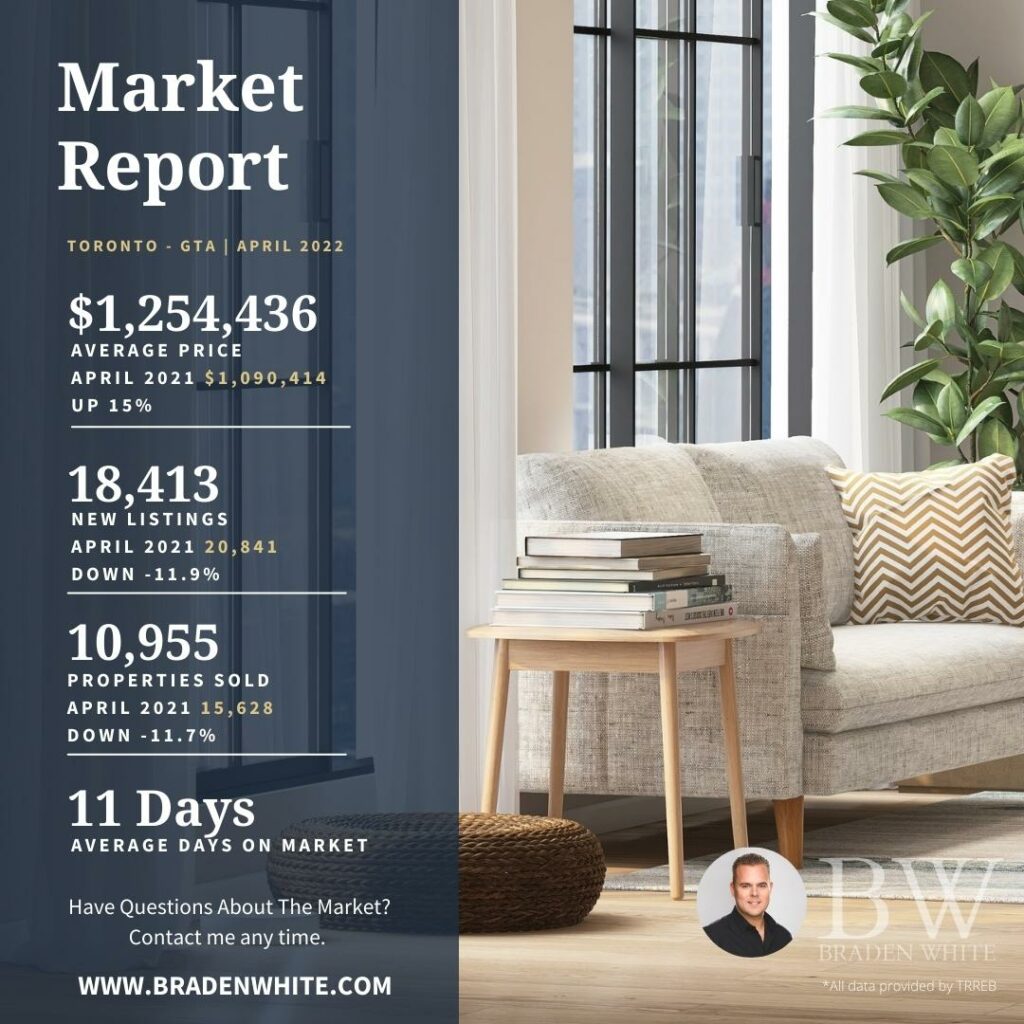As forecast, the rising mortgage interest rates (not to mention other factors at play, like the war in the Ukraine, inflation, and ongoing supply chain problems) had a direct impact on the number of residential properties reported sold in April. At the end of April, the five-year fixed mortgage rate was 4.19 percent. In February the five-year rate was 2.79 percent, an increase of more than 50 percent in a mere two months. Coupled with the mortgage stress test that all borrowers must undergo when qualifying, it is not surprising that many buyers, particularly first-time buyers, have been forced out of the market. Those who qualify may have had to lower their price-point expectations.
One should not interpret the decline in sales as an indication that the Toronto and area residential resale market is softening or becoming more affordable. Properties sold at lightning speed in April and at strong prices. Prices were lower than the record achieved in February ($1,334,408), but still 15 percent higher than the average sale price of $1,090,414 delivered last year. This April the average sale price came in at $1,254,436, a 6 percent decline from February’s record number.
In April 8,008 properties were reported sold, down 41 percent from the 13,613 properties that changed hands last April. Sales reported in April 2021 remains the second highest monthly total on record, only behind the 15,613 reported in March of last year. It is important to note that since last April’s reported sales, no month has come close to April’s numbers. The best month after April last year was May, reporting 11,903 sales, and 10,939 properties reported sold in March of this year. Most months reported sales well under 10,000. This April’s sales are consistent with reported sales since the record peak early in 2021.
Days on market and sales to list prices are the litmus test of the strength or weakness in the market. April’s results clearly demonstrate the continued strength in the Toronto and area marketplace. In April all properties reported sold, including 2,173 condominium apartments, sold in only 11 days. Depending on housing type and location, properties were reported sold in even less time. For example, all detached properties throughout the greater Toronto area sold in only 10 days, while all semi-detached properties sold in only 9 days. Semi-detached properties in Toronto’s eastern districts continued to amaze, selling in only 7 days.

Not only did all properties sell at the speed of light, but they did so at prices substantially higher than their asking price. All properties were (on average) sold at 107 percent of their asking price. In the City of Toronto, sales came in at 108 percent of their asking price, including condominium apartments. In Toronto’s eastern districts all properties sold at 113 percent of their asking price.
The clearest indication that the Toronto marketplace has not weakened and has not become more affordable is the performance of the condominium apartment sector. In April 2,173 condominium apartments were reported sold, 65 percent of them in the City of Toronto. The average sale price for all condominium apartments sold was $780,000. In the City of Toronto, the average selling price was $820,000, and in Toronto’s central districts, where 64 percent of all condominium apartment sales take place, the average sale price came in at an eye-popping $881,451. With average sale prices well above $1,000 per square foot, a buyer should expect substantially less than 800 square feet of living space for $881,451.
Rising mortgage interest rates should not cause market observers to lose focus on the fact that resale inventory levels remain historically low. In April months of inventory were only 0.9 for the entire greater Toronto area, and as in the case of days on market and sale to list price performance, even less depending on location and property type. Last year’s months of inventory were 1.3 months. With large numbers of immigrants making their homes in the greater Toronto area, the demand side of the market will continue. Almost 50 percent of more than 400,000 immigrants coming to Canada in 2021 relocated in Ontario and the greater Toronto area.
As we move into the late spring and summer months, and as interest rates continue to rise, we can anticipate negative variances compared to corresponding months in 2021. Notwithstanding these variances, and as this report has pointed out, the resale market will remain strong and as unaffordable as it has been since the beginning of the pandemic.
Have questions about the market, selling or buying?
Contact me any time. I’m happy to answer any questions you may have.
Prepared by Chris Kapches, LLB, President and CEO, Broker, Chestnut Park® Real Estate Limited, Brokerage.



